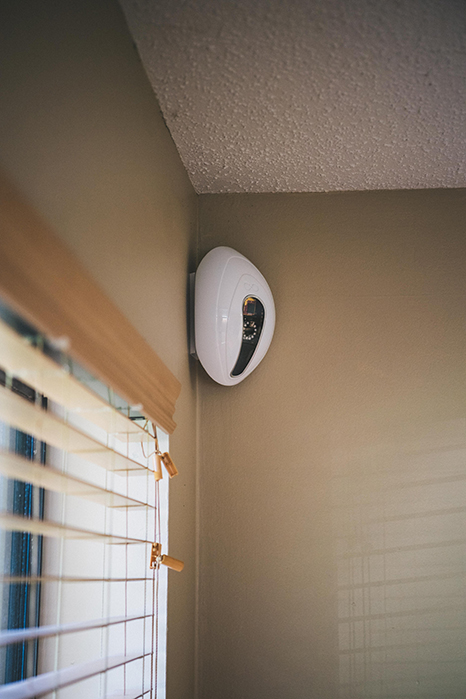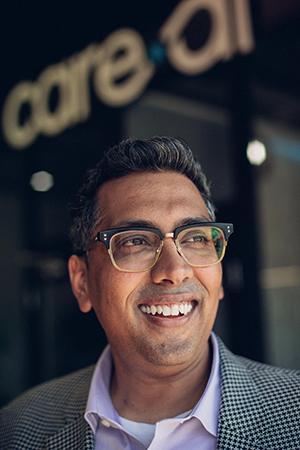Source: Thailand Medical News Dec 03, 2019 6 years, 1 week, 6 days, 15 hours, 14 minutes ago
An
artificial intelligence company based in Florida,Care.ai has partnered with Google to create an autonomous
patient monitoring system. By combining multiple sensors in a
patient’s room and neural network data analysis, the system can identify and predict accidents and clinical events, in some cases warning
healthcare staff before an incident happens.

Typically, preventable accidents and medical issues in
healthcare facilities result in thousands of patient deaths and significant patient suffering every year. These include falls, infections, and pressure ulcers. While such issues are theoretically avoidable, in many cases it is difficult or impossible for
healthcare staff to identify and anticipate every such instance, and in many cases, they can only hope to react to such circumstances once they arise.
To resolve this, the patient monitoring system developed by care.ai allows patient rooms to be “self aware,” whereby patients are automatically monitored 24 hours a day through advanced sensors, and
AI identifies and anticipates mishaps and issues, providing
healthcare staff with advanced warning.
Care.ai claims that the system allows healthcare staff to have more time to focus on their patients’ specific needs, rather than constantly keeping an eye on them or reacting to unforeseen events. Moreover, it should also allow
healthcare staff to be much more proactive, and lead to lower overall levels of avoidable mishaps in healthcare facilities.
Interview with Founder and CEO of care.ai
Thailand Medical News
(TMN) had the opportunity to talk to Chakri Toleti, Founder and CEO of care.ai, about the company’s technology.
 Chakri Toleti, Founder Care.ai
TMN: What inspired you to develop a patient monitoring system?
Care.ai:
Chakri Toleti, Founder Care.ai
TMN: What inspired you to develop a patient monitoring system?
Care.ai: In early 2018, I received a call that my mother in India had fallen and remained on the bathroom floor for half an hour before her caregiver found her. Even the best medical professionals simply can’t be everywhere at once, so they are often delayed in responding to patient issues. This was the catalyst for care.ai, fueled by the idea that patients should be able to maintain independence and privacy while still being kept safe.
While other industries, like transportation and aviation, have really transformed because of AI. Healthcare, however, has been slower to adopt it. I considered the autonomous driving – how self-driving technology constantly scans and
monitors its environments, responding to pedestrians, roadblocks, debris, etc. I thought, “what if we could bring the autonomous monitoring of a self-driving car to a hospital?” I created care.ai to turn every room into a Self Aware Room
TM.
TMN: Please give us some background on the types of incident the system is designed to anticipate.
Care.ai: These are the few use cases that we have deployed: staff efficacy, fall prevention, pressure ulcer prevention, and hand sanitization monitoring.
In our next phase 2 we will be deploying other use cases such as patient elopement prevention (wandering patients), security violations and visitor management.
TMN What type of sensors are included?
Care.ai: care.ai’s sensors use the most advanced technology of any solution in a healthcare setting. We use a wide range of propriety sensors within our patented hardware and software framework.
We are leveraging NVIDIA’s Jetson platform as a core compute engine and further accelerating the inferencing of the sensor data using Coral’s Edge TPU.
TMN: Please give us a basic overview of how the AI system learns to anticipate incidents in a patient’s room.
Care.ai: care.ai’s purposefully architected deep neural networks are trained on our propriety library of behavioral data, in fact, it’s the world’s largest library of human behavior data in a healthcare setting. Using edge-computing framework, care.ai’s deep neural networks deliver predictive results within nanoseconds. Using this proprietary library, the sensors identify recognized behaviors and immediately send relevant alerts to the appropriate care team members. The alerts are sent through a mobile app, SMS, desktop app, or integrated into existing HIS solutions using our SDK/APIs.
TMN: How has the collaboration with Google helped the system?
Care.ai: We chose to work with Google because their software and hardware frameworks for AI and now their capability to bring it to the edge – meet care.ai’s needs for the scale, accuracy and performance necessary to build an enterprise-class platform. Coral’s edge TPU has been instrumental for us to scale, allowing us to preserve patients’ privacy while still conducting constant monitoring and processing.
TMN: Is the system in use at present? How do you deal with patient confidentiality and data security?
Care.ai: Consulate Health Care, a leading provider of long-term healthcare services, is currently piloting care.ai. care.ai’s platform is the most scalable and secure AI solution in Healthcare, we process all of our data on the edge on a highly secure and custom-built operating system and publish the deidentified inferenced data in a secure and HIPAA complaint framework back to the server.

